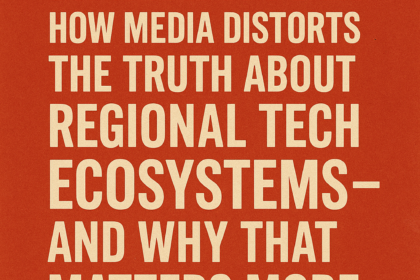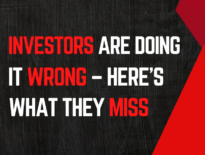
There’s a reason the phrase “don’t believe everything you read” never dies.
Because even when it’s printed in The Wall Street Journal, a brand so synonymous with business credibility that your uncle still calls it “The Paper,” the story can be skewed, shallow, and — let’s not mince words — wrong.
In this case, we’re talking about my home of Austin, Texas, and the breathless claim that its tech economy is “kind of dead.” That phrase, flung into the national consciousness via SignalFire’s latest report and dutifully parroted by WSJ, isn’t just an oversimplification. It’s a disservice. A distortion. And frankly, a little embarrassing for anyone who claims to understand how economic ecosystems actually evolve.
But let’s dig into this with the seriousness (and sarcasm) it deserves, because what’s really at stake here isn’t just a reputation for one city, but the broader understanding of how regions grow, thrive, and sometimes stumble on the way to building the future.
Article Highlights
- How Media Warps the Economic Map
- Austin Isn’t Dead. It’s Just Not a Startup Fantasyland
- Texas Is Not Just Competitive, It’s Redefining the Playing Field
- What the WSJ Didn’t Tell You (But Should Have)
- Media Literacy in the Age of Narrative Warfare
- Let’s Be Clear: Austin Is Still Austin (except SXSW is questionable now)
- Challenge Headlines
How Media Warps the Economic Map
Let’s get the obvious out of the way: media narratives matter. They shape investment decisions, government strategy, migration trends, and startup formation. When the Wall Street Journal signals that Austin is losing its luster, it’s not just reporting, it’s influencing. And when that report is based on cherry-picked data from a VC firm with its own coastal biases, presented without sufficient regional context, and published as if it were the full story? That’s not journalism. That’s branding.
And not even good branding.
SignalFire’s report shows that tech employment in Austin declined modestly in 2024; Big Tech down 1.6%, startups down 4.9%. Yes, that’s a trend worth a momentary consideration of whether or not it’s actually a trend. But here’s the rub: these stats are plucked from a post-pandemic, post-bubble world where even Silicon Valley is laying people off and “growth” looks more like “stability.” So, using a single-year dip as proof that Austin’s tech hub “never materialized” is like declaring the end of capitalism because your Robinhood portfolio is red this week.
More egregiously, the article quotes a few anecdotal voices — an ex-remote worker who didn’t find enough tech mixers and fled back to San Francisco, and a founder who missed the innovation culture of the Bay Area — to argue that Austin lacks vibrancy. This isn’t data. It’s Yelp reviews.
And to anyone who actually lives and builds here, it’s laughable.
Austin Isn’t Dead. It’s Just Not a Startup Fantasyland
Here’s what the article missed: Austin is evolving from hype to substance.
We’re no longer a “cheap alternative to the Bay Area.” We’re a region laying long-term infrastructure for AI, semiconductors, transportation, biotech, quantum, and yes — energy, the real engine behind the internet’s next act.
As Neha Sampat, founder of Contentstack, put it in response, “I respectfully push back on Austin’s tech scene as “kind of dead.” That’s not what I experience every day as a founder and CEO building a scaling company here, and as someone deeply connected to both the startup and enterprise ecosystems in this city. Sure, tech employment is down slightly, but that’s true in many places post-peak. Headlines focused solely on short-term numbers miss the bigger picture: Austin is evolving from a hot market to a mature one. There’s still plenty of funding, top-tier talent, and innovation, especially in AI, enterprise SaaS, and creator tech. I’ve seen this through the Mayor’s Task Force for Entrepreneurs, where the city is actively supporting the city’s innovation ecosystem and fostering collaboration across sectors. Austin’s small business community is also thriving. Like Austin Woman, which regularly spotlights successful local entrepreneurs. Austin attracts people who want to build, not just chase the latest hype cycle. RTO policies may have drawn some talent back to the coasts temporarily, but they haven’t erased what Austin offers: quality of life, community, and a culture of possibility. Tech may not look the same as it did in 2021. But the real builders are still here and just getting started.”
In fact, between 2018 and 2024, Austin added 30,000 high-tech jobs and posted a 7.79% increase in tech GDP—second only to Silicon Valley. A 0.63% dip in employment in 2024? That’s a rounding error in macroeconomic terms. Not a death knell.
Texas Is Not Just Competitive, It’s Redefining the Playing Field
What makes this narrative even more absurd is what’s happening under the radar: Texas is quietly rewriting the rules of economic development.
Earlier this year, Governor Greg Abbott signed legislation that finally puts Texas on equal footing with Delaware for corporate formation.
According to the Houston Chronicle, this law allows Texas-headquartered companies to form their legal entities in Texas — bringing home the legal, financial, and employment infrastructure that previously flowed east. Delaware was the default because of its pro-business legal system. Texas just built the same thing; except it’s attached to the world’s energy capital, a massive tech manufacturing base, two international borders, and the lowest state tax burden in the country.
“This law provides business decision makers the certainty that sound business judgments made in the best interest of shareholders will not be second guessed by courts, absent things like acts of crime,” Abbott said. “Business decisions are to be made by the elected officers and their shareholders, not by unelected judges.”
If you’re building in AI, quantum, space, or autonomous logistics, ask yourself: do you want to be where energy is abundant, talent is growing, and regulation is light? Or where rent’s $7K a month and the power grid collapses if the sun shines too hard?
That’s not a rhetorical question.
What the WSJ Didn’t Tell You (But Should Have)
Behind this narrative is a profound misunderstanding of how innovation ecosystems develop. Regional tech hubs aren’t magic mushrooms that sprout overnight. They’re complex, adaptive systems that thrive on consistent public investment, research infrastructure, and long-term private sector collaboration.
Austin has all of that.
Adriana Cruz’s Texas economic development playbook, “Bigger. Better. Texas,” isn’t just rhetoric. It outlines aggressive strategies for expanding venture capital, workforce pipelines, infrastructure modernization, and targeted recruitment in strategic industries. It’s the anti-coastal elite model: build from the ground up, not the top down.
Yes, Oracle shuffled its leadership back to Nashville. That’s news. But the AI, fintech, and chip design startups spinning out of UT, Dell, and the Texas Institute for Electronics? That’s the future.
“However, the story still inadvertently stumbles on a truism about modern Austin — or any relevant regional economy. Leaders must be hyper focused on ensuring ‘what’s next’ in edge tech happens in your home town. If Samsung isn’t even or ahead of TSMC, if Texas Institute of Electronics isn’t world class in semi adv packaging, if VISA falls behind other credit cards in tech, if our start ups are not at the edge, if we aren’t graduating leading edge talent, if we don’t significantly grow sources of local venture capital, then Texas and Austin will quickly be a legacy technology economy competing globally on cost. Technology is moving that quickly and we are relatively higher cost.” – Drew Scheberle; Executive Director of National Security Innovation Council.
In other words, the fight is about what’s next. And that fight is hardly lost. It’s just beginning.
Media Literacy in the Age of Narrative Warfare
So why does any of this matter?
Because in 2025, media isn’t just reporting on economic shifts. It’s helping to manufacture them.
Founders decide where to move based on perception. Investors look for “hot” cities. Governments prioritize regions with good press. And when major outlets like the WSJ publish pieces that lean on outdated tropes, biased anecdotes, and incomplete data, they distort the flow of capital, talent, and opportunity.
This isn’t just a shame for Austin, the point is that capital and talent flow to where likely allocated to poor returns on investment while the opportunities most meaningful to workers and investors are overlooked.
This is where media literacy matters. Readers must ask: Who wrote this? What’s their source? What’s left unsaid? And what does local data, experience, and insight tell us instead?
You wouldn’t base your startup’s product roadmap on a LinkedIn comment. Why would you base your economic worldview on a few job market swings?
Let’s Be Clear: Austin Is Still Austin (except SXSW is questionable now)
Yes, return-to-office mandates have shuffled some remote workers back to the coasts. Yes, not every startup that landed here during the boom stuck around. That’s not a sign of failure. That’s natural selection. The builders stayed.
CEO of Opportunity Austin, Edward Latson: “What we’re seeing in Austin isn’t a retreat from tech, it’s a recalibration after several years of unprecedented growth. It’s worth noting that the Austin region has added 30,000 high-tech jobs since 2018 and tech GDP grew 7.79% in 2024—second only to Silicon Valley. Our employment shift was just 0.63%, which signals stabilization and hardly counts as an exodus. Austin has a diversified economy, ongoing infrastructure investment and an innovation ecosystem that continues to attract global companies and talent. Frankly, one that I’d put up against any other major metro in the county. These trends reflect a maturing market that’s well-positioned for long-term strength.”
Still skeptical? Fine. Here’s a simple formula:
- AI needs energy ? Texas has it.
- Space tech needs real estate + regulatory freedom ? Texas owns that.
- Autonomous transportation requires infrastructure and low-regulation testing zones ? Hi, Texas.
- Quantum needs research institutions with defense and aerospace crossover ? Texas again.
- Massive data centers? Try building one in San Francisco.
- Cloning? we made wooly mice for crying out loud!
Challenge Headlines
Don’t let a lazy narrative shape the future of a city / or your business.
If you’re a policymaker, founder, journalist, or just someone who cares about where the economy is headed, start digging deeper. Hell, we’re right here; economists and local leaders who study this stuff rather than sharing opinions as facts. Question the sources. Ask whose voices are missing. Find the local perspective. And consider that maybe, just maybe, the people actually building something have a better grasp of what’s happening than the consultants scanning LinkedIn data from New York.
As I said in my own commentary on the WSJ article: “On one hand, I suppose I’m in favor of this article hitting the WSJ because it might dissuade people from moving here and give us a chance to manage the growth. On the other hand, I find it odd that it seems like the outcome of a press release from a data company hoping to get some attention, because it’s a pretty poor representation of the Austin community and potential.” But if journalists want the deep dive into WHY Austin and Texas are still booming? We’re here. Ready to talk. And building the next generation of everything.
Just don’t expect to find it all on the coasts anymore.




I’m from NYC and I’m a big fan of the Austin tech ecosystem…and have been for 35 years!
Austin is just one neighborhood in the Texas Triangle region. It’s both the cultural and economic connections that creates these links to execute on a massive regional ecosystem. The Texas Triangle is out of the starting blocks and ahead of everyone else in North America.
And much more in store David
This is what I’m seeing as well with my own local eyes too, Paul. Totally agree. Last night at the Plug and Play event I went to, it was packed!
re: “…and dutifully parroted by WSJ, isn’t just an oversimplification. It’s a disservice. A distortion. And frankly, a little embarrassing for anyone who claims to understand how economic ecosystems actually evolve.”
Not to get off topic but… And yet slop like this gets to call itself journalism? When are regular people going to wake up and realize these outfits aren’t in the informations business. They’re not in the integrity business. They’re in the shamelessly say anything if it pull more views / clicks / eyeballs business.
Fact check? Question “conventional wisdom”? Etc? Ha! That takes time. Why bother when they can shovel slop, continue to self-identify as journalism, and the majority of the masses don’t know or care about the difference? Ya can’t make this stuff up. Sad really.
/rant
p.s. Thank you for taking the time to set the record straight. It’s a shame it needs to be done. Kudos to you for stepping in and filling the void.
Mark Simchock yeah it really struck me as a more compelling narrative and example of media bias and influence, than explicitly about Austin
The lesson for all, despite all that criticism, is probably: USE IT!
Bravo…well said!
“…the best damn breakfast tacos in America.”
Amen. I’ve desperately craved Austin-style breakfast tacos ever since discovering them at my first SXSW. We have some pretty good tech companies here in CA, but nothing remotely resembling a Torchy’s.
Antone Johnson working on exporting them but we’re starting with Rudy’s BBQ and Bucee’s
Personally I’d be happy to see ‘the NY media’ lose interest in Austin and let its reputation return to the great place it was. All the Silicon Valley VC hype doesn’t sit well in the heart of Texas, a state of pragmatic and rational, yet optimistic and adventurous people. Blow off the froth and appreciate the beer. We need to keep Austin TX weird, not let it get CA stupid.
Mr. O’Brien, follow this url (CNBC) about Nashville, TN.
Makes Me Ask The Question like what happened to Austin?? This coverage could have been about Austin a few years ago.
Uh… Austin is a ‘Blue’ city in a ‘Red’ state.
Love to hear your response since I follow CNBC and Bloomberg (and WSJ).
This mini expose or documentary should get attention of Austin!!!!
Again, would love to hear short feedback… especially with ORACLE supposedly moving headquarters to Nashville..
_______________________________
https://www.cnbc.com/video/2025/05/23/why-everyone-is-moving-to-nashville.html
_______________________________
Walter – we talked at the Starbucks at Great Hills Trail sometime ago..
[email protected] (U of Illinois – Champaign-Urbana. Yea, member of U of Illinois Austin Group)
Walter Criley Roper Well, that’s a video — and Nashville certainly needs a write-up. Here’s my hot take:
People are moving to Nashville for the same reasons they once flooded Austin and the Valley: cultural gravity pulls harder than tax policy. Music is the magnet, but what it’s really drawing in is identity — a sense of place, purpose, and story. Nashville’s sound gave it soul, and now that soul is giving it scale.
Like Austin before it, Nashville has become a vibe before becoming a venture. That’s the blueprint: when the culture is compelling, capital follows. You don’t get unicorns without first getting the weirdos, the wanderers, and the weekend bands who can’t afford L.A.
And yes, blue in red matters, a lot.
I’ll have to write this up properly… stay tuned.
Patti Burke, Jeff Gulko, Oliver Muoto, Cameron Crain, Jackie Augustus, mark montgomery, Ryan Brown — give us some hot takes on why people are moving to Nashville ?
Paul. Don’t you think it is time you start writing editorials for the ABJ ? Unfortunately, it feels like the “business news” rags are being filled these days with writers, not business savvy writers. It’s a bad combination to have a person who knows how to write business words, but does not understand business concepts and has zero business experience (same is true in politics, but that’s a different conversation). thanks. tt
They know where to find me ?
I spent some time years ago, trying to get the Press to realize that they needed to change their approach. Then, I would have done so for free; now, I’d be adding a few hundred thousand readers to their articles… and I might as well just keep them to myself (unless they’re hiring)
Austin needs to be careful — a “more mature” ecosystem can choke off early-stage stuff. A lot of what was attractive about Austin — that “regular” things were easy, for example — are no longer the case. That’s stuff to be mindful of.
Thank you Paul and others for pointing out the lack of good journalism in the WSJ article as a communications professional I concur. And now my economic development viewpoint from Opportunity Austin, we appreciate drawing attention to the success of the Austin Region. The fundamentals are strong: tech employment is holding steady, GDP growth is leading the pack and major players like Samsung, Tesla and Apple continue to expand their footprint here. The numbers tell a clear story—Austin is still one of the most competitive tech regions in the country. And the talent continues to want to be in a place like Austin with a great cultural vibe and quality of life.
Of course, the region’s growth has spurred challenges, but the collaboration of regional leaders is pressing to address affordability, infrastructure and sustain the momentum. And just today on the policy front, the Texas legislature passed SB2206 a robust research and development tax credit program that benefits businesses of all sizes. It will strengthen efforts to attract and retain companies, while enabling local universities to continue partnering on cutting-edge research and the development of innovative technologies and products. Austin will continue to be resilient and grow.
That jaded writer must have been off put by the sincerity and authenticity of those here, especially us native Texans who are building. Just saying
Stacy, Incredible summary—and precisely the kind of grounded, data-driven optimism we need more of in national media coverage. The WSJ piece missed the forest and the trees, and your point about fundamentals couldn’t be more relevant: real estate speculation and out-of-town hot takes don’t build ecosystems—R&D credits, workforce depth, and public-private alignment do. I’d love to connect further on how we bridge these narratives nationally while supporting the real work happening locally. What you’re advancing at Opportunity Austin is exactly the kind of strategic story the rest of the country needs to hear from us. Let’s talk?
Yeah, I was a tad suspicious of that WSJ piece.
I hate the way everyone talks about Austin likes it’s some gold vein that you need to mine while it’s still there. As someone born and raised in Austin (no longer there), it’s a mid sized city with the amenities of a mid sized city. It’s growing and has a tech economy but it’s also a lot more than that. Out of state folks got delusional about what it is and then get upset when it falls short of their expectations.
We (Austin) is the definition of a BOOM TOWN. Simple as that.